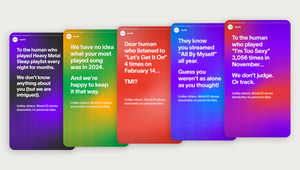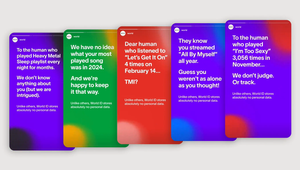
This AI Campaign Uses a Deepfake Girl to Warn of Identity Abuse

A new campaign from Deutsche Telekom and creative agency adam&eveBERLIN demonstrates the increased risks parents face thanks to the rise of data misuse and artificial intelligence (AI).
In a hero film, AI is dramatically used to draw attention to risks of itself - AI. In addition to the opportunities of digitalisation, Telekom wants to point out the urgency of responsible handling of personal data in the digital world.
Pictures of holidays, family celebrations or weekend trips with the whole family - these are emotional moments that friends, and relatives want to share immediately. Often this happens all too carelessly. Once posted on the internet, this personal data is available worldwide and without limits. With the #ShareWithCare campaign, Deutsche Telekom wants to raise awareness for responsible handling of photos and data. The communication kicks off with the oppressive deepfake spot "A Message from Ella". It uses the example of a family to show the consequences of sharing children's photos on the Internet. Telekom draws attention to so-called "sharenting" - a much-criticised practice in which parents share photos, videos, and details of their children's lives online.
"Telekom offers the best and most secure network," says Uli Klenke, chief brand officer at Deutsche Telekom. "But in addition to access to this network, we also need the necessary knowledge and tools for safe and responsible handling of data on the Internet. Because the development of artificial intelligence holds opportunities and risks. In the spot, we let the AI warn us about itself. And thus, underline fascination and awe at the same time. We have to learn to deal with both factors appropriately."
Deepfake spot raises awareness of the issue of sharenting
The film stages and exaggerates a social experiment that could have taken place in the same form - because the technology for it has long been available today. The image of a nine-year-old actress, called 'Ella', acts as the film’s protagonist. With the help of the latest AI technology, a deepfake of the girl was created. Deepfakes are videos, images, or even sounds artificially generated by machine learning. In the video, you can see how the 'grown-up Ella' turns to her surprised parents. She sends a warning from the future and confronts mother and father with the consequences of sharing pictures of their child on the internet. For the first time, a virtually aged deepfake of a nine-year-old child has been created so that she can act and argue like an adult woman. Ella is representative of an entire generation of children.
'Sharenting' promotes identity theft
Christian Loefert, head of marketing communications Telekom Germany, emphasises, "Every person has the right to decide on his or her own digital identity! At the same time, studies show that an average five-year-old child has already had around 1,500 pictures uploaded without their consent by those they trust most: their parents. This material is unprotected on the net. With #ShareWithCare, we are campaigning for a mindful approach to the images of our loved ones."
Experts predict that by 2030, two-thirds of all cases of identity theft will occur in this way (source: The New Yorker). By carelessly sharing children's photos and other data, such as names or ages, via social media and short messaging services, guardians unintentionally expose children to risks. Possible consequences include profiling by data brokers, hacking, facial recognition, paedophilia and other threats to privacy and security.
Digital literacy is an integral part of digital participation
"We want to prevent children from becoming victims of cybercrime through no fault of their own," says Marike Mehlmann-Tripp, cluster lead social engagement, group corporate responsibility at Telekom. "For all people to be able to participate in the digital world, it is essential that they can move safely, self-determinedly and confidently in the digital space. Media competence is an integral part of digital participation. That is why we are committed to promoting digital skills through numerous initiatives."
To support parents in protecting their children's privacy and minimising digital risks, Telekom provides numerous initiatives and advice in cooperation with partners who pursue the same objective:
With the Teachtoday initiative, Deutsche Telekom is committed to promoting safe and competent media use and supports children and young people, parents & grandparents and educational professionals with practical and everyday tips and materials from the Teachtoday Toolbox.
With the DsiN digital driving licence (DiFü), the initiative 'Germany Safe on the Net' offers a further education and certification program that is recognised throughout Germany. It enables people of all ages to learn digital use and security skills and thus to use digital services confidently in private and professional contexts.
In the 'Sicher digital' guidebook, Telekom Security GmbH passes on its expertise in data protection and data security to customers and interested parties. The site raises awareness of risks on the Internet and provides concrete tips on how to counter them by means of central basic rules and everyday tips.
















